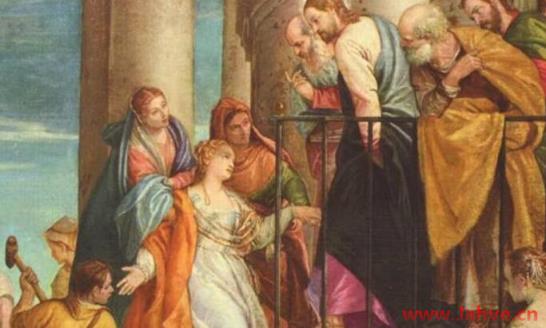
原文|Bishop Barron
翻译|Carrie2017-8-9 朋友们,在今天的福音中,我们目睹了耶稣和一名顽强的妇人之间的一段异乎寻常的对话。福音书中耶稣似乎被人智胜的场景寥寥无几,这是其中之一。首先耶稣对她不屑一顾。然后祂的门徒要撵走她。最好,耶稣向她掷出一句令人泄气的话:“我被派遣,只是为了以色列家迷失的羊;拿儿女的饼扔给小狗,是不对的。”这名妇人—也许是个寡妇且肯定是个外邦人—碰了三个钉子。这里她代表着所有外人,孤零零地处于边缘地带。然后我们听到她快人快语地回答:“可是小狗也吃主人桌子上掉下来的碎屑。” 所有怠慢行为都阻止不了她。那么,这个故事意义何在?长久以来,大家强调的都是该妇人在面对耶稣给出的“考验”时表现的毅力。这是不无道理的。希波的奥古斯丁说我们祈祷是为了扩展意志来接受天主将要给我们的恩赐。Friends, in today's Gospel we witness the strange exchange between Jesus and a feisty woman. It is one of the only scenes in the Gospels where someone seems to get the better of Jesus. First Jesus refuses even to acknowledge her. Then his disciples tell her to back off. Finally, Jesus hits her with a devastating one-liner: "I have come for the lost sheep of the house of Israel; it is not right to throw food to dogs."This woman—probably a widow and certainly a foreigner—is given a triple brush-off. In this she stands for all those who stand outside, on the margins, alone. Then we hear the woman's snappy come-back: "Even the dogs eat the scraps that fall from the master's table." She will not be put off by this brusque behavior.Now, what do we make of this story? A long tradition stresses the perseverance of the woman in the face of the "test" that Jesus sets for her. And there is something right about it. Augustine says that we pray in order to expand our will to accept what God is going to give us.
朋友们,在今天的福音中,我们目睹了耶稣和一名顽强的妇人之间的一段异乎寻常的对话。福音书中耶稣似乎被人智胜的场景寥寥无几,这是其中之一。首先耶稣对她不屑一顾。然后祂的门徒要撵走她。最好,耶稣向她掷出一句令人泄气的话:“我被派遣,只是为了以色列家迷失的羊;拿儿女的饼扔给小狗,是不对的。”这名妇人—也许是个寡妇且肯定是个外邦人—碰了三个钉子。这里她代表着所有外人,孤零零地处于边缘地带。然后我们听到她快人快语地回答:“可是小狗也吃主人桌子上掉下来的碎屑。” 所有怠慢行为都阻止不了她。那么,这个故事意义何在?长久以来,大家强调的都是该妇人在面对耶稣给出的“考验”时表现的毅力。这是不无道理的。希波的奥古斯丁说我们祈祷是为了扩展意志来接受天主将要给我们的恩赐。Friends, in today's Gospel we witness the strange exchange between Jesus and a feisty woman. It is one of the only scenes in the Gospels where someone seems to get the better of Jesus. First Jesus refuses even to acknowledge her. Then his disciples tell her to back off. Finally, Jesus hits her with a devastating one-liner: "I have come for the lost sheep of the house of Israel; it is not right to throw food to dogs."This woman—probably a widow and certainly a foreigner—is given a triple brush-off. In this she stands for all those who stand outside, on the margins, alone. Then we hear the woman's snappy come-back: "Even the dogs eat the scraps that fall from the master's table." She will not be put off by this brusque behavior.Now, what do we make of this story? A long tradition stresses the perseverance of the woman in the face of the "test" that Jesus sets for her. And there is something right about it. Augustine says that we pray in order to expand our will to accept what God is going to give us.

微信小程序
微信扫一扫体验

微信公众账号
微信扫一扫加关注
顶部
